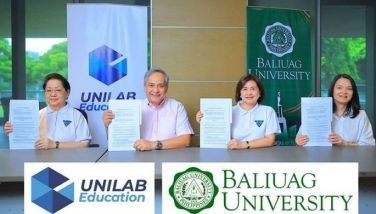A new SHS body
In her book “The Nation’s Journey to Greatness,” former education head Mona Dumlao-Valisno talks about what she calls “the lack of an effective coordination between and among the trifocalized education agencies.” She is referring to the perceived problem of having DepEd, CHED, and TESDA work together cohesively.
Fortunately, in the Steering Committee of the K to 12 program, the three agencies are now working much more closely together than they did in the past.
For the Senior High School level, however, there will be huge problems of coordination if the suggestion of various organizations is followed that Higher Education Institutions (HEIs) will handle DepEd subjects.
The HEIs will have to report to DepEd in addition to reporting to CHED (as they do now) and to TESDA (as those that have ladderized programs do now). That means filling up three sets of forms and having three sets of inspectors and accreditors visit the schools.
Valisno suggests, since the law already provides it, that the DepEd Secretary be “the responsible official to coordinate and harmonize the education agencies.” This means giving the DepEd Secretary authority over the CHED Chair and the TESDA Director-General in matters that involve all three agencies.
Valisno is correct, but unlike her, I am a bit more cautious about this straightforward solution to the obvious problem of coordination. Initially, I would like to limit the authority of the DepEd Secretary to being head of what should be a new government body to supervise Senior High Schools (SHS).
We do not need a law to establish such a body. An Executive Order will be enough to put up a Coordinating Council for Senior High Schools, to be chaired by the DepEd Secretary, with the CHED Chair and the TESDA Director-General as members. A secretariat consisting of equal numbers of staff from the three agencies, with a few private sector experts (in order to keep to the spirit of public-private partnerships) such as the heads of COCOPEA and PASUC, would make the new body workable.
The idea is for an HEI to report to only one body, rather than three. To burden HEIs with all the paperwork necessary for an SHS to succeed is to give the K to 12 reform a constraint it does not need.
For example, I can imagine how difficult it would be for an SHS to get permission to graduate students. The SHS would have to ask both DepEd and TESDA. That would make the process unwieldy and time-consuming. Similarly nightmarish would be the process of reporting to DepEd, CHED, and TESDA the workload of faculty (because there is a limit to what a particular teacher can teach every term). If there were only one government body coordinating and monitoring SHS, many such problems would be solved.
Giving HEIs the responsibility to put up SHSs is not as easy as it looks, but it might be the only thing that will save our private HEIs from going bankrupt in 2016, when all students will go to Grade 11 instead of enrolling in college.
THANK YOU. My recent stay in Germany was made very pleasant by a number of people.
First of all, let me thank the officials and staff of the Philippine Embassy in Berlin: Mardomel Celo D. Melicor, Roberto G. Manalo, Adrian Elmer S. Cruz, Anna Marie P. de Vera, Azela G. Arumpac, Generosa Balocating, Jose Antonio S. Buencamino, Flordeliza P. delos Santos, Estellita Casuga, Leonora de Ramos, Lota V. Fajardo, William O. Tan, Rosemarie S. Ramos, Marjorie R. Hahnelt, Vieto Pilapil, and Emerenciana Reyes, who were all personally very helpful to me. I enjoyed not only the meals they hosted but also their stimulating conversations. I want to thank drivers Edwin and Lito, who took me to my meetings in Berlin, as well as Anna Alexandra Natividad and Merin Rayos for hosting my stay in the Philippine residence. Of course, my gratitude goes first and foremost to Ambassador Maria Cleofe R. Natividad, who managed my entire stay.
In Frankfurt, my meals were hosted by Victoria Villar-Demmer, Tonette Beroya-Eigner, Donna Hess, Vickie Zimmermann, Fr. Melchor Braga, and Lina Kuehlen. To them all I owe my newfound love for German bread. I also thank Monique Zimmermann, the first exchange student from Germany in the consortium between Goethe University in Frankfurt and The Manila Times College, as well as Prof. Dr. Arndt Graf, my counterpart in Goethe University; they were very kind to me on my first day in Germany.
The Don Bosco Mondo officials were extremely hospitable to me during my stay in Cologne and Bonn. I single out Stephan Kunz and Ulrike Wiegelmann, who were my hosts during that part of my visit to Germany, as well as Annette Feldman who drove me and Fr. Dionisio Miranda, SVD, from Bonn to Frankfurt. Fr. Miranda, Geronimo D. Sta. Ana, Philip N. Tan, and I were the presenters during a day-long meeting in Bonn with top executives of German firms and government agencies.
I explored a number of cooperative projects in Germany. Of particular interest to my readers would be a project that would have German development funds available for the K to 12 program of our Department of Education. More on that if the project materializes, which I pray it will.
- Latest
























